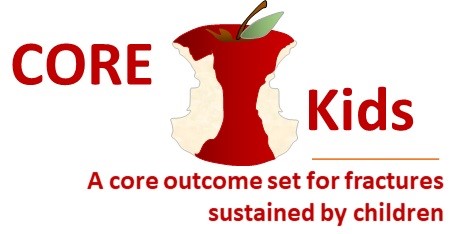CORE-Kids: A core outcome set for children with fracture
Broken bones or fractures are exceptionally common in children, with 1/3 of UK children breaking a bone before their 17th birthday. There are many different treatments available for these broken bones and relatively little research to identify which treatments are best for different children
The Trauma Outcomes Group are leading the CORE-Kids project to develop a core outcome set. This is a list of key outcomes to be measured in all trials and research studies into broken bones during childhood. Adoption of the core outcome set will ensure a consistent set of outcomes are always measured to ensure treatments can be fairly compared.
Key facts

Who are the team members for this study?
Why are we doing this study?
There is an urgent need to improve the available research to help parents and their children select the best treatments following a broken bone. Core outcome sets in other medical fields have been shown to reduce the variability in outcome reporting. This helps to maximise the benefit from research studies as they can be combined to draw meaningful comparisons between different treatments.
Additionally, by consulting with a wide range of people (surgeons, parents, therapists, researchers), we will ensure that the recommended outcomes are both of value and relevant.
What does this research involve?
The first phase of this research is to decide what we should be measuring for children with broken bones. In order to decide this, a long list of potential outcomes has bee devised through screening and evaluating the current literature and in-depth interviews with children and their parents.
The list of outcomes will be evaluated through a series of online questionnaires with parents and professionals from around the world.
A meeting is due to be held in March 2020 to review the available results and to select the most important outcomes for the core outcome set.
Once the core outcome set is agreed, then work will begin on trying to identify the best way to measure the outcome identified. This is likely to involve the use of patient reported outcome measures for some, if not all, of the outcomes. The CORE-Kids COHORT study is in development to test some of these outcome measures with children from around the United Kingdom who have broken bones in their lower limb.
How many people are involved in this research study?
In total, the study will involve over 500 participants to help shape and select the most important outcomes to measure. The individual phases of the research have involved:
- In-depth interviews (complete): 20 families
- Online Delphi survey (in progress): 269 participants
- Consensus meeting (recruiting now): 24-30 participants
- CORE-Kids Cohort (in development): 300 participants
Patient and parent involvement
The study is underpinned with enormously valuable support from parents and children who have experience of living with fractures who have contributed through workshops in our fracture clinic and through our patient participation groups.
The last meeting was held at Twycross Zoo on the 20/2/2020 and was a roar-ing success! The next patient participation group will be scheduled in July 2020.
If you are a parent of a child who has had a broken bone, or a young person who has a broken bone we would be keen to hear from you. We conduct patient involvement groups through a mixture of forums including online, telephone and face-to-face to fit around busy schedules. To find out more, or to get involved e-mail the project coordinator Ben Marson.
Who is funding the research?
The National Institute for Health Research (NIHR) is funding this research through a Doctoral Fellowship that has been awarded to Ben Marson (NIHR300240).
Study Progress
Latest update: The Third round Delphi opened on 7th February 2020. Responses have already been received from 112 participants – thank you all for your help and support.
Find out more
We are continually looking for a range of ‘experts’ to help us decide on the most important outcomes.
You could be a parent or a young person who has experienced a fracture, a surgeon, nurse, physiotherapist or teacher who has had to deal with the impact of a broken bone.
To get involved, email the project contact or ask to be added to the mailing list for the study newsletter.
Study publications
- COMET Registration
- PROSPERO Registration
- Twycross Zoo PPI Report